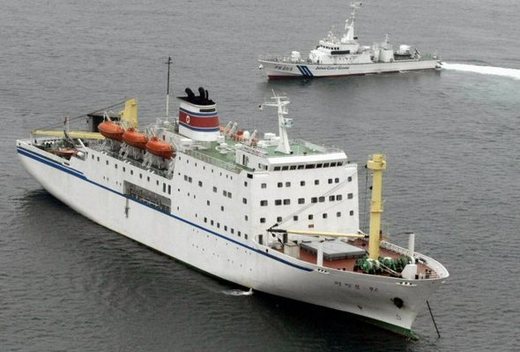 |
|
A North Korea's shuttle ship stay off the shore of a Japanese port on July 5, due to Japanese government's decision to ban it from making port calls in Japan.
|
Tokyo continues quest for U.N. to impose sanctions
Japan has placed aggressive diplomatic and military pressure on North Korea since the communist regime test fired a group of missiles on July 5. North Korea has maintained its right to conduct the missile tests, citing its sovereignty. Shortly after the missile launches, Japan imposed independent economic sanctions on the communist regime. It then called an emergency meeting of the United Nations Security Council, where it led a movement to adopt a resolution against the North, offering its own draft to the proceedings. As a non-permanent member of the Security Council, Japan pressured its five permanent members, the U.S., Britain, France, China and Russia, to adopt a resolution. It has continually placed pressure on China and Russia, who hold a veto in the council, to agree to a resolution, which is stronger than a statement by the council. It is also persuading other non-permanent members to vote on the resolution, which it hopes would include sanctions against Pyongyang. Tokyo has repeatedly cited the fact that Japan is in direct range of North Korean missiles in its quest to apply pressure on the North. Public sentiment in Japan has been increasingly leaning toward a hard-line stance against Pyongyang. Japan’s Foreign Minister Taro Aso said on July 8, "Only China and Russia say yes to adopting a resolution, but they say no to imposing sanctions on North Korea." The Asahi Shimbun said yesterday that the member nations of the U.N. are surprised at the swift and firm attitude of Japan. A Japanese source pointed out, "Such behavior is unimaginable for the Japanese delegation, which has valued a sense of balance and coordination." Japan plans to lead movements against Pyongyang at meetings of other international groups. It said it would push for a special statement at the G8 summit due to be held in St. Petersburg, Russia, in mid-July. G8 refers to a self-declared group of eight nations that share diplomatic and economic ties. Japan also has a plan to include contents criticizing North Korea in a Chairman’s Statement at the ASEAN Regional Forum (ARF) ministerial meeting slated for the end of this month. The United States has been largely supportive of Japan’s increased pressure. On July 5, the two countries apparently divided up "tasks" to be completed on the issue at a meeting between Japan’s Chief Cabinet Secretary Shinzo Abe and the U.S. Ambassador to Japan Thomas Schieffer. In addition, some observers consider Tokyo’s push for a vote on the U.N. Security Council resolution as tantamount to a diplomatic war with China. Japan and China have long vied for diplomatic supremacy in Asia. Japan may have calculated that if China exercises its veto on the council, it would bring into relief China’s isolation from the interests of the rest of the region. A high-ranking official in Japan’s Foreign Ministry who asked not to be named was embarrassed by Tokyo’s stepped-up efforts, saying that "Japan seems to have been made a puppet of the U.S." The official said it seemed like things had devolved into polarized squabbling between U.S. and Japan on one side and China and Russia on the other. Song Il-ho, the North Korean envoy in charge of talks on restoring relations with Japan, told a group of Japanese reporters in Pyongyang, "A Foreign Ministry spokesperson warned that if someone attempts to pick a quarrel with and put pressure on North Korea, we will have to take tougher physical actions...Japan is utmost in this regard." Song was quoted by the Choson Shinbo, a pro-Pyongyang publication in Japan. Japan also conducted its own missile training, targeting an Unmanned Aerial Vehicle (UAV) by mobilizing three 4,950-ton Hiei destroyers off the shores of Hawaii. Regarding this, Pyongyang "warned" on July 7 that Japan could be a target of "tough physical countermeasures."





